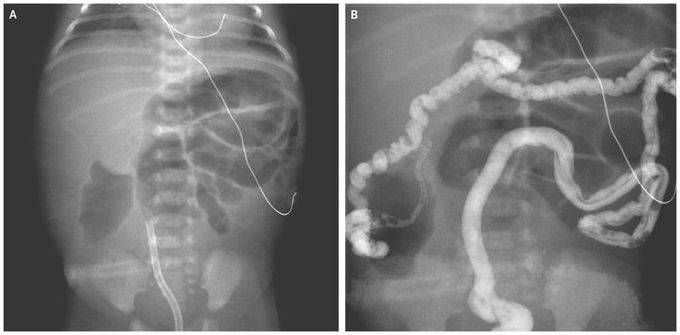


Meconium Ileus in a Neonate with Cystic Fibrosis
In a full-term newborn girl, abdominal distention with emesis and failure to pass meconium developed at 12 hours of age. A diagnosis of cystic fibrosis had been made during pregnancy, when genetic analysis of amniocentesis fluid showed the fetus to be heterozygous for known disease-causing mutations p.F509del and p.V603SfsX8 in the cystic fibrosis transmembrane conductance regulator (CFTR) gene. A radiograph of the abdomen showed dilated loops of small intestine that aroused concern for intestinal obstruction (Panel A). A water-soluble contrast enema showed microcolon and multiple filling defects throughout the colon and distal ileum (Panel B), findings that were consistent with a diagnosis of meconium ileus. Exploratory laparotomy with ileostomy was performed. Meconium ileus, which can be an early manifestation of cystic fibrosis, can also occur in extremely premature infants who have a very low birth weight. Obstruction in the ileum results from intraluminal accumulation of inspissated meconium. The differential diagnosis of delayed passage of meconium also includes Hirschsprung’s disease and the meconium plug syndrome. At 7 weeks of age, removal (takedown) of the patient’s ileostomy was performed. At 14 weeks of age, she underwent additional abdominal surgery because of the formation of a fistula that had connected the underlying bowel to the incision site of the former ileostomy.

